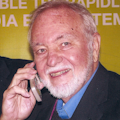Engineering students, hobbyists, and even professionals can use Digilent’s Analog Discovery Design Kit to learn or review electronic basics and analog circuit design away from the lab and at home or in their dorm room. It’s a complete package of virtual instruments powered by the host laptop’s USB port (see the figure).
Built with Analog Devices components, the kit includes two 50-Msample/s, 5-MHz oscilloscopes and two 50-Msample/s, 5-MHz waveform generators. It also offers two fixed power supplies (±5 V), a 16-channel logic analyzer, Digilent’s WaveForms software, and a breadboarding socket. Furthermore, it features manuals and a kit of Analog Devices ICs and related components for performing experiments.
Digilent designed the lab-in-a-box to stimulate motivation and learning by making it faster, easier, and more convenient to perform hands-on lab work. Students who design, build, and test their own circuits learn faster, retain more, and master many of those skills not usually taught in a university classroom.
I recently tired a Discovery kit and liked what I experienced. I built a couple of circuits and played with the instruments, which the software sets up and configures. Single-pin headers plug into the breadboarding socket and attach to the Discovery I/O leads.
Like most complex software, the extensive WaveForms software requires some learning time. After I got comfortable with it, I was amazed at what you could do with it. I was particularly happy with the Bode plotter, which really makes filter design and testing come alive.
Initially, I wanted higher-voltage supplies, but the ±5-V supplies proved more than adequate. I didn’t try out the digital I/O capability, though you do have a 16-channel logic analyzer available along with the logic signal generation capability.
While some top tier colleges and universities have already adopted such lab kits, I wish more would do so. The Discovery and kits like it make electronic fundamentals and analog design real and come alive. These products also can provide more lab experience in current courses. They even can be used to inexpensively add lab projects to courses that don’t have any already. Lectures and textbooks are still the basis for most courses, but nothing grabs students faster and holds them than hands-on practice with real-world equipment and parts.
The student price for the Discovery is only $99, which is less than the price of most new textbooks today. Colleges can build a lab for $149 each, and other individuals may buy one for $249. Analog Devices and Digilent both have a considerable amount of support materials for Discovery. Check out www.analog.com/university and www.analog.com/virtualclassroom.
For more details on the Discovery and Digilent’s more advanced Explorer design platform, go to www.digilentinc.com. You can even download the WaveForms software and test it out in demo mode to get a feel for the capability. Digilent makes a full range of learning kits as well, including those for FPGA and microcontroller experimentation.
About the Author

Lou Frenzel
Technical Contributing Editor
Lou Frenzel is a Contributing Technology Editor for Electronic Design Magazine where he writes articles and the blog Communique and other online material on the wireless, networking, and communications sectors. Lou interviews executives and engineers, attends conferences, and researches multiple areas. Lou has been writing in some capacity for ED since 2000.
Lou has 25+ years experience in the electronics industry as an engineer and manager. He has held VP level positions with Heathkit, McGraw Hill, and has 9 years of college teaching experience. Lou holds a bachelor’s degree from the University of Houston and a master’s degree from the University of Maryland. He is author of 28 books on computer and electronic subjects and lives in Bulverde, TX with his wife Joan. His website is www.loufrenzel.com.